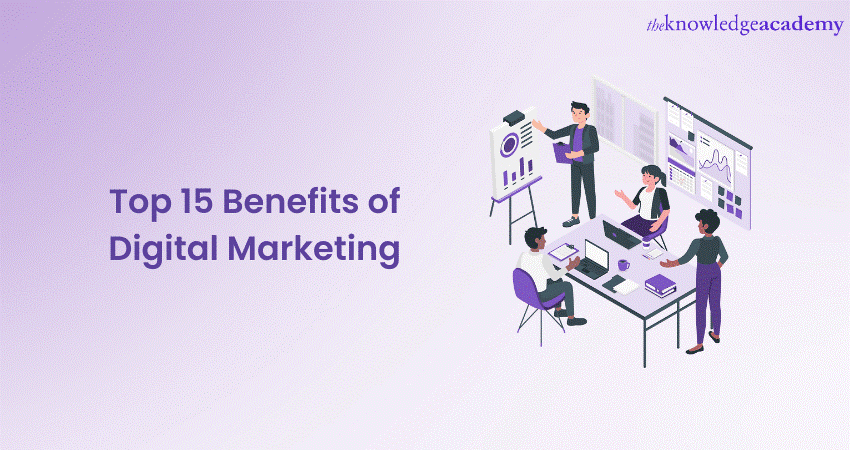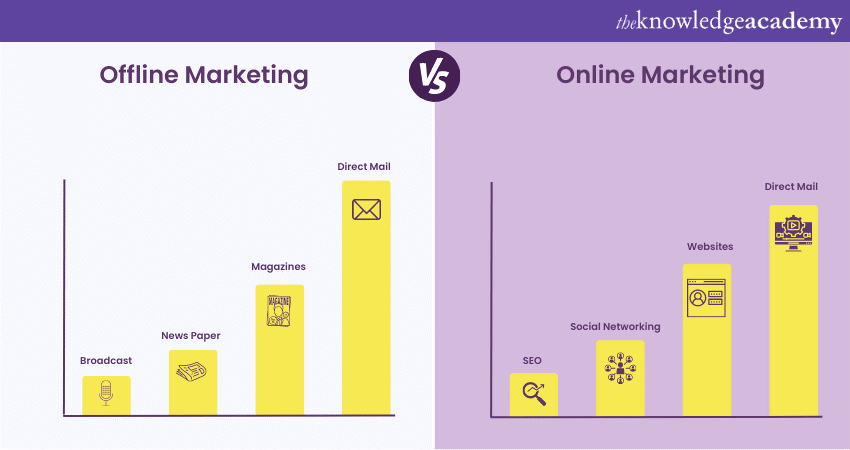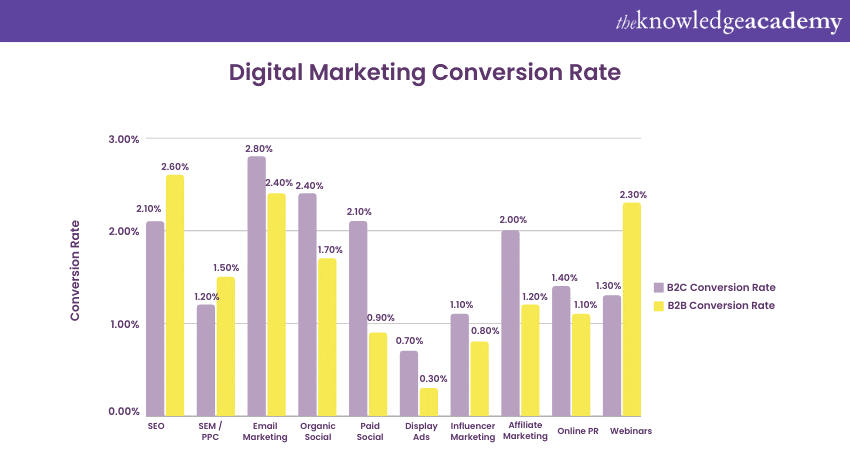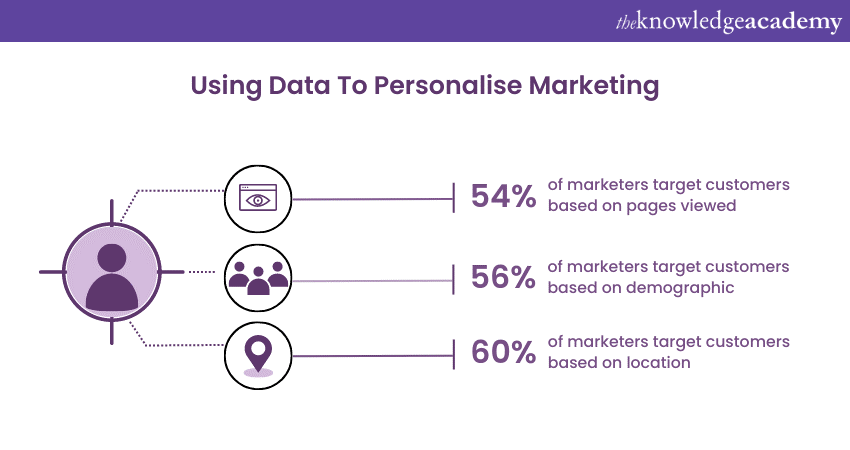We may not have the course you’re looking for. If you enquire or give us a call on +36 18508731 and speak to our training experts, we may still be able to help with your training requirements.
Training Outcomes Within Your Budget!
We ensure quality, budget-alignment, and timely delivery by our expert instructors.

The essence of Marketing is based on forging relationships with the right consumers at the right time and being a part of all business stages. There are multiple types of Digital Marketing methods based on the type of content dealt with. Search Engine Optimisation (SEO), content Marketing, Search Engine Marketing (SEM) and email marketing are some of them. It’s safe to say that these modes provide several Benefits of Digital Marketing. Thus, it becomes the best way to interact with your target audience, establish a relationship and promote your brand.
According to Statista, the global mobile revenue in the Digital Marketing sector would be up to 69% by 2027. Thus, it is the right time to leverage the benefits that Digitial Marketing provides. The top Benefits of Digital Marketing include global reach, approachable medium, cost-effectiveness, brand awareness, and many more. You can read this blog to learn more!
Table of Contents
1) Top Benefits of Digital Marketing
a) Global Reach
b) Cost-effectiveness
c) Brand Awareness
d) Effective Targeting
e) Multiple Strategies
f) Increased Engagement
g) Measurable Results
h) Better conversion rates
i) Better Chance at Remarketing
j) Generating Leads
2) Top Digital Marketing Channels and How to Use Them
3) Conclusion
Benefits of Digital Marketing
Almost all businesses have taken to the internet nowadays, and this has increased competition among brands. Companies fight for a spot that will make their brand visible to the maximum number of consumers, which is a testament to how effective Digital Marketing is. Let’s look at some of the reasons that contribute to its importance. Here are the top 15 Benefits of Digital Marketing:
1) Global Reach
Global reach marks the initial Digital Marketing advantage. Traditional marketing is constrained by geographical limitations. This makes the creation of an international marketing campaigns challenging, costly, and labour-intensive.
In contrast, Digital Marketing operates on the internet, offering vast potential reach. Even a modest local business can tap into an international audience through an online store. This online accessibility has created numerous growth avenues for businesses to pursue. The blend of global outreach and visibility presents a significant opportunity for any business.
Cost-effectiveness

Marketers excel when they handle their budgets responsibly. Fortunately, embracing Digital Marketing allows for maximum efficiency, even with limited resources. Many Digital Marketing approaches require minimal initial investment.
For instance, strategies like Search Engine Optimisation (SEO), social media engagement, and content marketing are highly effective online promotion methods. They demand only dedication and skill rather than financial resources.
Additionally, digital platforms don't impose minimum budget thresholds for initiatives like social media ads or Search Engine Marketing (SEM) campaigns. This means that regardless of your budget size, you can tailor a campaign precisely to your target audience. This can also help you establish spending limits and maintain your financial constraints.
Brand Awareness
One of the major Benefits of Digital Marketing is that with its help a brand recognition among the consumers for a long run can be established. Thus, creating a brand recognition should be a key component within the marketing competencies you apply.
When customers already know about what services or products a brand is dealing with, both, new buyers and old ones tend to stick with the brand.
Thus, Digital Marketing lets brands to form a consistent and robust online presence. Such presence can be seen on social media platforms, YouTube channels, blogs, and other digital platforms too.
The tools like PPC, SEO, and Email Marketing can open the ways for you to deeply connect with consumers. Recently, social media is the best communication channel for businesses looking to grow their reach.
Effective Targeting
Digital Marketing offers the freedom to choose the group of people you wish to target. Instead of blindly promoting brands to a large audience, it's possible to determine a target audience and direct your efforts towards them. The first step in attracting a group of potential customers is to understand their interests.
When you are directing your marketing towards a group who will find your brand and its values interesting, then you don't need to make a considerable effort convincing them to be customers. Different audiences can be defined in terms of their geographical position, age, etc. A targeting approach based on location is aimed at a certain area which contains the highest number of customers or the people with the same views.
Your choice of medium also contributes to determining a target audience.
For instance, Instagram, a social media site can be enlisted because it has numerous users, majority being the young people.
Convert your site's position and visitors into well-organised sales leads with our Search Engine Optimisation Course – join now!
Multiple Strategies
Digital Marketing also offers you the flexibility to use different strategies and tactics depending on your business goals, type, and industry. Furthermore, different businesses have separate preferences and needs. For example, a B2B business that wants to generate more leads from international markets may use a different strategy than a B2C local business that sells clothes online.
Several typical tactics within Digital Marketing encompass content marketing, SMM, SEO, email marketing, video marketing, influencer marketing, etc. Each of these strategies has its advantages and disadvantages, and you need to test and analyse the results to find out what works best for your business. A successful Digital Marketing strategy adapts and evolves according to the changing needs of your business.
Increased Engagement
One of the Benefits of Digital Marketing is that it enables you to increase your engagement with your audience. Engagement is the degree of interaction and involvement that your audience has with your brand online. Various metrics, such as likes, shares, comments, views, clicks, and more, can be employed to gauge it. The more you engage with your audience online, the more you can build trust and loyalty with them.
Digital Marketing allows brands to create and share content that appeals to their audience's interests, needs, and emotions. You can use Digital Marketing tools, like chatbots, quizzes, polls, surveys, etc., to interact with your audience in real-time and provide them with personalised experience
Measurable Results
The effectiveness of marketing strategies can be measured using web analytics software, a key benefit of digital marketing. This technology helps companies determine the best follow-up plans for future campaigns based on current feedback. Analytics provides a clear plan for creating effective marketing strategies. Key data collected includes total website visits, traffic channels, bounce rate, mobile traffic, and engagement rate.
Understanding these metrics is crucial. Total website visits can be increased by creating engaging content like blogs and videos. The Bounce rate measures the number of visitors who leave immediately without engaging. A high bounce rate indicates issues in design, content, or colors, which need addressing to improve engagement. Mobile traffic is growing as more users access the internet via phones, making mobile-friendly websites essential. Poor alignment or awkward image placements can drive visitors away, so optimising websites for mobile devices is crucial for improving mobile traffic.

Conversion rates in Digital Marketing refer to the percentage of users that have visited your website and taken an action which fulfils your company’s Marketing objectives. A high conversion rate is reflective of high-quality content and effective Call-To-Actions (CTAs).
Using Digital Marketing metrics to measure the performance of different aspects of your strategy is an effective process that shows you where the lead got converted from. Conversion is successful in various stages, such as clicking on an ad or providing your email address to the page you are directed to. These processes can lead to the conversion of a potential customer to a paying customer.
Better Chance at Remarketing
Remarketing is the practice of redirecting advertisements to users who have already shown interest in your brand. It is directed towards users who have visited a brand’s website before but have not taken any action to engage.
Personalised ads are highly effective at the remarketing stage. Swiggy is a good example that illustrates the use of remarketing. When you add a food item to the cart and do not purchase it right away, the company sends you personalised messages on your phone. Sometimes, they even mention your name. The inclusivity creates a sense of trust in the user, and most of the time, they go back to the application to complete their order or make a new one.
Consumer behaviour patterns have indicated that there are multiple types of consumers. While some prefer to visit websites and fulfil their needs right away, others find it comfortable to take time to consider a brand before engaging with it. Remarketing is the perfect way to renew the latter half’s interest and successfully convert them to a customer.
Generating Leads
A lead is a potential customer who has shown interest in your product or service. Generating leads involves attracting these potential customers and gradually converting them into actual customers. The process begins when a user discovers your website and clicks on a Call-To-Action (CTA), leading them to a landing page that collects user information, such as their email, which is then used to nurture the new relationship.
A sales funnel is a crucial tool for lead generation, representing the customer's journey when making a purchase. It provides insights into the customer's mindset at different stages, helping you craft the right messages for each phase.
There are four main stages in the sales funnel. The first stage is Awareness, where your brand first gets noticed, whether through social media or word-of-mouth. The quality of your marketing strategy influences how users progress through the funnel.
The second stage is Interest, where users research the brand to understand its function and relevance in their lives. They analyse the problem your brand aims to solve and assess if your product or service is the best solution.
The third stage is Decision, where users are familiar with your brand and look for final details before making a purchase, such as price and warranty options. The final stage is Action, where the user decides whether to act on their interest and make a purchase. The success of lead generation is measured by the completion of a deal.
Improved Visibility
Establishing a presence in the digital domain is an essential aspect of digital marketing. Reflecting your brand personality in every ad and piece of content you publish helps embed your brand in the public's mind, leading to desirable results. Various strategies can be employed to improve visibility.
One effective method is SEO, which involves optimising your content or website to improve its ranking on search engines. This can be achieved through posting quality content like blogs, resulting from extensive keyword research, and adding external and internal links. Blogs are particularly useful in driving traffic to your website. Creating high-quality blogs with engaging and informative content using effective SEO strategies is a proven way to enhance visibility.
Another strategy is posting customer reviews. Positive customer reviews can significantly influence readers, so it's recommended to showcase customer reviews and testimonials on your brand website. The more reviews published, the more credibility your brand gains.
Social media platforms like Instagram, Facebook, and LinkedIn are also beneficial for brand marketing. With their vast number of users, these platforms offer significant opportunities to improve reach and expand your customer base. Content can be posted and shared in various forms, including images and videos, to enhance brand visibility.
Personalisation

Personalisation is the process of sending messages crafted to suit the preferences of the customers, making them feel like the brand is listening to them. It makes users feel like their relationship with the brand is valuable and worthwhile. Personalisation is a proven method of retaining customers, as a high percentage of people have reacted positively to it. The process begins with learning about your consumers' needs and credentials, which will serve as the basis for your content.
Personalisation can be implemented in various ways, from the content of the emails you send to the captions of your brand's social media posts. The effectiveness of this method relies solely on the content creators and strategy makers of the company. When customers feel recognised as individuals, they are more likely to engage with your product or service.
Customer loyalty is one of the benefits that personalisation can offer. When your content is tailored around the personality of your user, they feel acknowledged, creating a sense of trust. This, in turn, makes your brand stand out and become more memorable, leading to increased sales.
Scope of A/B Testing
A/B testing is a crucial component of digital marketing with extensive applications in the field. It involves comparing two versions of the same element or campaign to determine which one performs better. A/B testing can be used to optimise various aspects of your digital marketing efforts.
For website optimisation, you can enhance your website design and functionality by testing different elements such as Calls-to-action buttons (CTAs), Landing Pages (LPs), and Navigation Menus (NMs). In social media marketing, you can create more effective content by testing different versions of Post Copy (PC), Videos (V), and Images (I) to see which one garners more engagement from your audience.
Email marketing can also benefit from A/B testing by experimenting with different variations of Subject Lines (SLs), Images (I), and Email Copy (EC) to determine which version achieves higher Open Rates (ORs) and Click-through Rates (CTR). For mobile app optimisation, you can refine the User Experience (UX) by testing different elements such as app icons (AI), In-app Messaging (IM), and Push Notifications (PN).
Improved Customer Experience
Customer Experience (CX) in the digital domain is all about customers' interactions with a brand across various channels. One of the key factors that contributes to a smooth CX is the ease with which users can access information from websites.
Digital Marketing allows brands to customise their products or services to match the customer persona.
The Internet of Things (IoT) can always be a type of information source about customers' selection. These data are then processed to serve as a form of baseline to create better approach strategies towards consumer behaviour. The “personalised” strategy is all important when it comes to all the efforts aimed at delivering excellent Customer Experiences.
Greater ROI
Return on Investment (ROI) is an important metric for any marketing campaign, and both Traditional Marketing & Digital Marketing play a role in achieving it. However, Digital Marketing excels with its capability to target specific audiences, track real-time results, and adjust strategies on the fly. Digital Marketing often delivers higher ROI compared to traditional marketing methods. Businesses can optimise budgets by investing in campaigns that show the most promise. Scaling them as needed.
Interested in implementing Digital Marketing strategies to promote your brand? Sign up for our Digital Marketing Courses now!
Top Digital Marketing Channels and How to Use Them?
The choice of Digital Marketing channels depends on the specific Marketing goals, target audience, budget, and industry. A successful Digital Marketing strategy often integrates multiple channels to optimise reach and achieve different outcomes.
1) Search Engine Optimisation (SEO): SEO aims to enhance a website's structure and content to make it more relevant and visible on Search Engine Results Pages (SERPS). It helps attract organic traffic and boost brand visibility.
2) Pay-Per-Click Advertising (PPC): PPC involves creating ads for search engines or other platforms and paying when users click on the ads. It can be used to increase conversions, generate leads and boost website traffic.
3) Social Media Marketing: Another channel is social media platforms like Facebook, Instagram, Twitter, and LinkedIn offer opportunities to connect with a target audience, drive traffic to landing pages or websites and create brand awareness,
4) Content Marketing: Content Marketing involves producing and distributing content to attract and retain a specific audience. It can be in the form of articles, videos, infographics, blog posts or podcasts and helps establish brand authority and foster customer relationships.
5) Email Marketing: Email Marketing involves sending personalised messages to a list of subscribers. It can be used to nurture leads, increase conversions, market products or services, and build customer loyalty.
6) Influencer Marketing: Influencer Marketing leverages the popularity and influence of individuals or content creators to endorse a brand or product. It can help raise brand awareness, reach new audiences, and increase engagement.
7) Affiliate Marketing: Affiliate Marketing involves collaborating with affiliates who promote your services or products for a commission. It can help expand your reach, drive sales, and increase brand exposure.
8) Display Advertising: Display advertising involves placing visual ads on social media platforms, websites or mobile apps. It can be used to drive traffic to your website and retarget users who have shown interest.
9) Video Marketing: Video Marketing utilises video content to communicate and engage with the audience. It can be used to demonstrate products, provide tutorials, share customer testimonials, or create entertaining content to increase brand engagement.
10) Mobile Marketing: Mobile Marketing focuses on targeting mobile device users through tactics like mobile ads, mobile apps, and SMS Marketing. It can be effective for reaching on-the-go consumers and driving local foot traffic.
Conclusion
Digital Marketing has become incredibly popular in brand marketing. As the number of internet users gradually keeps growing, it favours products and services that use Digital Marketing techniques. Thus, businesses can leverage several Benefits of Digital Marketing, and this blog demonstrates them making it easier for a beginner to understand them all.
Learn to implement data-driven Marketing strategies by signing up for our Data-driven Marketing Course now!
Frequently Asked Questions

Influencer marketing boosts brand's digital presence. It uses the credibility and help of influencers. This helps connect with targeted audiences and increase brand awareness. It also drives engagement and conversions. Influencers' authentic endorsements enhance trust and credibility.

Yes, Digital Marketing can be advantageous for small businesses in different ways. With this, small businesses can get a competitive edge over others, achieve measurable results, and better manage their budget.

The Knowledge Academy takes global learning to new heights, offering over 30,000 online courses across 490+ locations in 220 countries. This expansive reach ensures accessibility and convenience for learners worldwide.
Alongside our diverse Online Course Catalogue, encompassing 17 major categories, we go the extra mile by providing a plethora of free educational Online Resources like News updates, Blogs, videos, webinars, and interview questions. Tailoring learning experiences further, professionals can maximise value with customisable Course Bundles of TKA.

The Knowledge Academy’s Knowledge Pass, a prepaid voucher, adds another layer of flexibility, allowing course bookings over a 12-month period. Join us on a journey where education knows no bounds.

The Knowledge Academy offers various Digital Marketing Courses, including the Digital Marketing Course, Search Engine Optimisation (SEO) Course and Google Analytics Certification. These courses cater to different skill levels, providing comprehensive insights into Web Analytics Metrics for Measuring Success.
Our Digital Marketing Blogs cover a range of topics related to Digital Marketing, offering valuable resources, best practices, and industry insights. Whether you are a beginner or looking to advance your Digital Marketing skills, The Knowledge Academy's diverse courses and informative blogs have got you covered.
Upcoming Digital Marketing Resources Batches & Dates
Date
 Digital Marketing Course
Digital Marketing Course
Fri 24th Jan 2025
Fri 28th Mar 2025
Fri 23rd May 2025
Fri 25th Jul 2025
Fri 26th Sep 2025
Fri 28th Nov 2025







 Top Rated Course
Top Rated Course



 If you wish to make any changes to your course, please
If you wish to make any changes to your course, please


